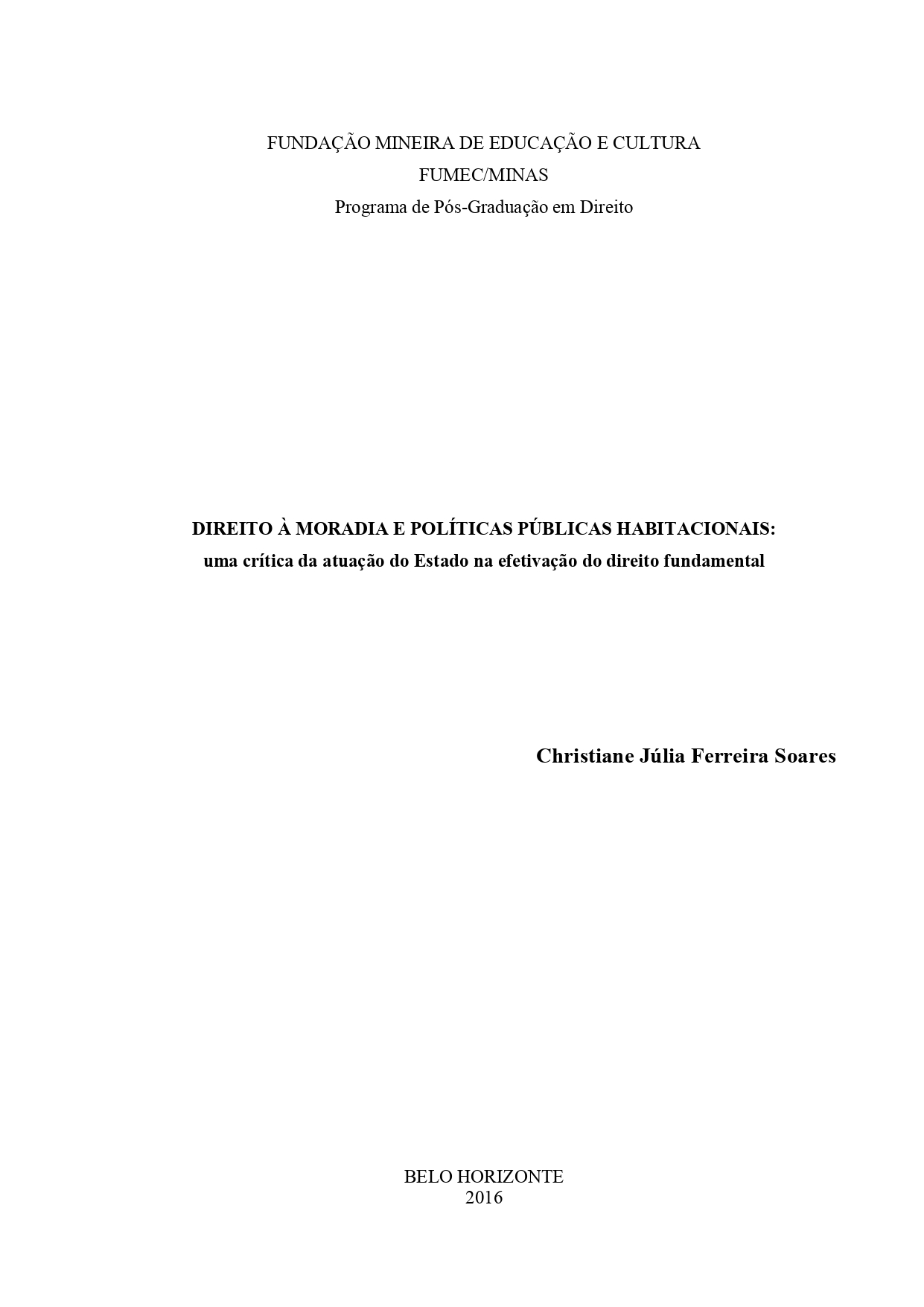Direito à moradia e políticas públicas habitacionais: uma crítica da atuação do Estado na efetivação do direito fundamental

Visualizar/
Data
2016Autor
Soares, Christiane Júlia Ferreira
xmlui.mirage2.itemSummaryView.MetaData
Mostrar registro completoResumo
O objetivo da presente pesquisa é o estudo do direito à moradia como direito social de
responsabilidade do Estado Brasileiro e a reflexão do uso de algumas políticas públicas
habitacionais para a efetivação desta garantia fundamental. O direito à moradia é um dos
núcleos que possibilita a consecução da dignidade da pessoa humana, razão pela qual deve ser
implementado. De um lado, temos uma extensa legislação que garante este direito. De outro,
uma realidade cada vez mais perversa: o crescimento de déficit de moradias e de habitações
inadequadas. Não é a ausência de previsão legal que dificulta a garantia desse direito
fundamental, mas sim a falta de efetivação no plano real. Para fundamentar a nossa hipótese,
estudamos algumas políticas públicas habitacionais direcionadas às populações carentes: o
programa Minha Casa, Minha Vida; a regularização fundiária da Lei nº 11.977/09; a
concessão de uso para fins de moradia e a desapropriação por interesse social, apresentando
seus pontos positivos e negativos. Ao pesquisarmos alguns casos concretos, verificamos que a
efetividade deste direito depende muito do “interesse político”, pois a administração faz uso
ou desuso das políticas públicas habitacionais, de acordo com sua conveniência. Assim, temos
uma legislação amplamente garantidora do direito à moradia e instrumentos capazes de
subsidiar a atuação do Estado na efetivação desta garantia fundamental, mas muitas vezes o
que falta é “vontade política”. Utilizando-se do argumento da discricionariedade na escolha da
política pública e da “teoria da reserva do possível”, o direito à moradia não vem sendo
prioridade nas administrações públicas. Por fim, refletimos sobre algumas adversidades
encontradas para efetivação deste direito social e apresentamos algumas soluções para o
melhor uso das políticas públicas habitacionais. The aim of this research is the study of the right to housing as a social right Brazilian
state responsibility and the reflection of the use of some public housing policies for the
realization of this fundamental guarantee. The right to housing is one of the core that enables
the achievement of human dignity, reason should be implemented. On the one hand, we have
an extensive legislation guaranteeing that right. On the other, an increasingly perverse reality:
the growth of housing deficit and inadequate housing. There is no legal provision that makes
it difficult to guarantee this fundamental right, but the lack of effectiveness in the real plane.
In support of our hypothesis, we studied some public housing policies targeted to needy
populations: Minha Casa, Minha Vida program; the regularization of Law 11.977/09; the
grant of use for housing purposes and the expropriation of social interest, with its positive and
negative points. While studying some specific cases, we found that the effectiveness of this
right depends largely on the "political interest" because the administration makes use or
disuse of public housing policies, according to your convenience. Thus we have a widely
legislation guarantor of housing rights and instruments to support the State's role in the
realization of this fundamental guarantee, but often what is lacking is "political will". Using
the argument of discretion in the choice of public policy and the "reserve theory as possible,"
the right to housing is not a priority in public administrations. Finally, we reflect on some
adversities found for realization of this social right and present some solutions for the best use
of public housing policies.
